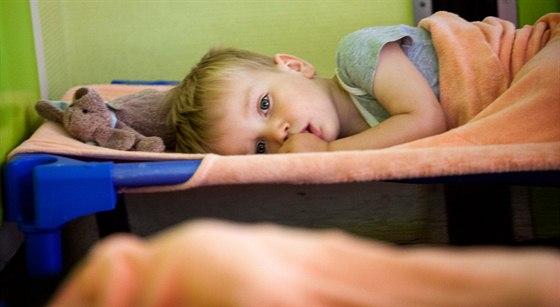Children learn basic habits only in kindergartens. Parents don't have time for them<
Can you guess how long it will take you to put twenty little baby shoes on your tossing feet? How long would it take you to feed ten children? How much would it take to repack? As impossible as it may seem, it has become an increasingly common autumn practice for teachers from Prague kindergartens in recent years.
Many children go to kindergarten unprepared, sometimes you can say immature. "They can't eat with a spoon on their own, they can't drink from a mug and they need a bottle," says the director of a kindergarten in Prague 9.
It doesn't matter what kindergartens point out the problem. It is happening all over Prague and to a large extent it is related to how busy Prague parents are. Many mothers return to work when their children are two years old - they have to because of the economic situation. When a child circulates between grandmothers and nannies for a year, no one can systematically devote himself to education.
Ironed, soapy children who do not hold a spoon by themselves
These are definitely not problem families. Some children go to kindergarten, ironed up, but have the skills that older generations acquired a year earlier at the age of three.
"Recently, the number of unprepared children has risen to a quarter to a third of the class," says experienced teacher Ivana Lacinová, who taught in a kindergarten in Suchdol until the end of June. She is now a member of the committee of the Association of Preschool Education.

Researchers have already noticed a trend. They found that almost half of children between the ages of three and five tend to be immature in kindergarten. Most often they have problems with self-assertion, they cannot cope with failure, and thirty-two percent of the sixteen hundred children surveyed were too dependent on their mothers. It seems that half of the children are not ready for kindergarten until they are four years old. It used to be three years.
A typical "mom" can't eat with a spoon or drink from a mug and shows a "shot" in the locker room. That means he gets up, raises his hands, and waits for the teacher to change him. The three-year-old should wear or take off the basic one, trousers or a sweatshirt, the teachers will then help him only with a jacket, warm-up warmers and tying shoelaces. If the child cannot wear finger gloves, he should wear mittens. Just try to put twenty pairs of gloves on two hundred fingers.
Addressed teachers do not play for parents. "Every child is different and we work with him accordingly. We don't deal with what's going on at home, we try to keep the child developing. If he can't eat with a spoon, he learns it slowly and simply spends more time at lunch," he says. internship director of the school and kindergarten on Lyčková náměstí Jan Korda.
The first three months of kindergarten are the most difficult, even for teachers
Three-year-olds like to learn skills from classmates and learn quickly. For the first three to four months, the teachers have a hard time, Lacin says, but during that time the children usually catch up.
"We are trying to prevent this. We are already warning parents what a child should be able to do. Unfortunately, some of them cannot cope with it," says the association's vice-president Ludmila Šprachtová. For example, for the last three years, her kindergarten teachers have found that some children are not used to washing their hands.
"In September, therefore, we have fortnightly projects where children learn to wash their hands, flush and greet," describes Šprachtová, who runs a kindergarten in Sokolovská Street in Liben. He also tries to get the parent to spend the first days in kindergarten with the child. Then he will best understand that the teacher is not in a position to feed twenty children.
Experts advise a simple trick to deal with problems. When the offspring reaches the stage where they will have lunch at a spoon or a mug at lunch, when it will be his favorite phrase "myself", do not feed him, let him eat without help. Thanks to new skills, his self-confidence will grow, he will be happy that he is not dependent on the help of another.


 Tags:
Tags: Prev
Prev







